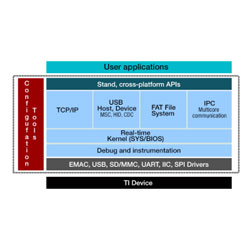Data de postagem: 2015-04-14
As the Internet of Things (IoT) continues to cover more everyday products, simplifying software development for connected applications is becoming increasingly important.
In response, Texas Instruments announced an important update to its complete real-time operating system (RTOS), which brings ease of use related to power management operations in advanced operating systems such as Android and Windows, to Embedded microcontroller (MCU) based applications.
As a result, with TI-RTOS 2.12, developers can now easily leverage the power management capabilities built into TI devices to create IoT applications with longer battery life. TI-RTOS 2.12 is designed to be freely available to TI ��s entire embedded processing portfolio, enabling developers to focus on application differentiation and faster time to market through pre-built and tested connectivity stacks and drivers without writing The underlying code. code. The new version of RTOS is a major update to the platform, which was first launched in 2012 and leverages TI's more than 20 years of experience in providing production-quality OS solutions for real-time applications.
TI-RTOS 2.12 provides a standard set of multitasking, power management, and peripheral driver APIs on all supported devices. This makes it easy for developers to port applications between different TI MCUs running TI-RTOS, reducing development time for next-generation products. By providing a free, widely used software platform that is not proprietary, the updated platform also benefits TI Design Network software members.
TI-RTOS 2.12 is now integrated with the Energia development environment. Energia and Arduino are based on the Wiring framework, enabling developers to quickly prototype applications without having extensive embedded experience. This integration of TI-RTOS 2.12 combines Energia's familiar and easy-to-use API with new and unique features such as multithreading. This is an easy way to start making multi-threaded applications on TI's low-cost LaunchPad development kit, while taking advantage of the familiar hardware abstraction layer. Key Features: 1-Battery life is extended through TI-RTOS 'power management capabilities, which allows developers to save a lot of energy for their applications with minimal effort. 2-Extensive wireless connectivity options, including Wi-Fi, Bluetooth Smart and ZigBee can be achieved by integrating with TI's SimpleLink Wi-Fi CC3100 / CC3200 solution and SimpleLink CC26xx / CC13xx ultra-low-power wireless MCU's on-chip stack integration. 3-Open source (BSD) license for OS components and drivers to easily and freely deploy any application. 4-Reduce development time by using a large number of existing software libraries to reduce the time to build software from scratch. 5 �C Powerful documentation and extensive examples allow developers to quickly evaluate TI-RTOS functionality and start development. 4-Reduce development time by using a large number of existing software libraries to reduce the time to build software from scratch. 5 �C Powerful documentation and extensive examples allow developers to quickly evaluate TI-RTOS functionality and start development. 4-Reduce development time by using a large number of existing software libraries to reduce the time to build software from scratch. 5 �C Powerful documentation and extensive examples allow developers to quickly evaluate TI-RTOS functionality and start development.
TI-RTOS 2.12 is available now and supports all TI devices for low-power IoT applications, including the new 32-bit MSP432 MCU, SimpleLink Wi-Fi CC3100 / CC3200 solution and SimpleLink CC26xx / CC13xx wireless MCU. It also supports TM4C MCU, C2000 real-time control MCU and Sitara processor. The company said that TI will continue to expand its RTOS products to other MCU and processor families.
